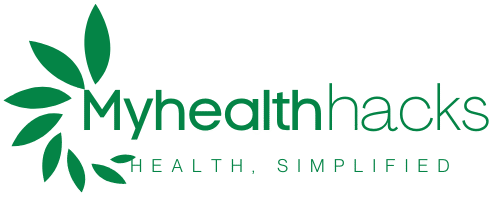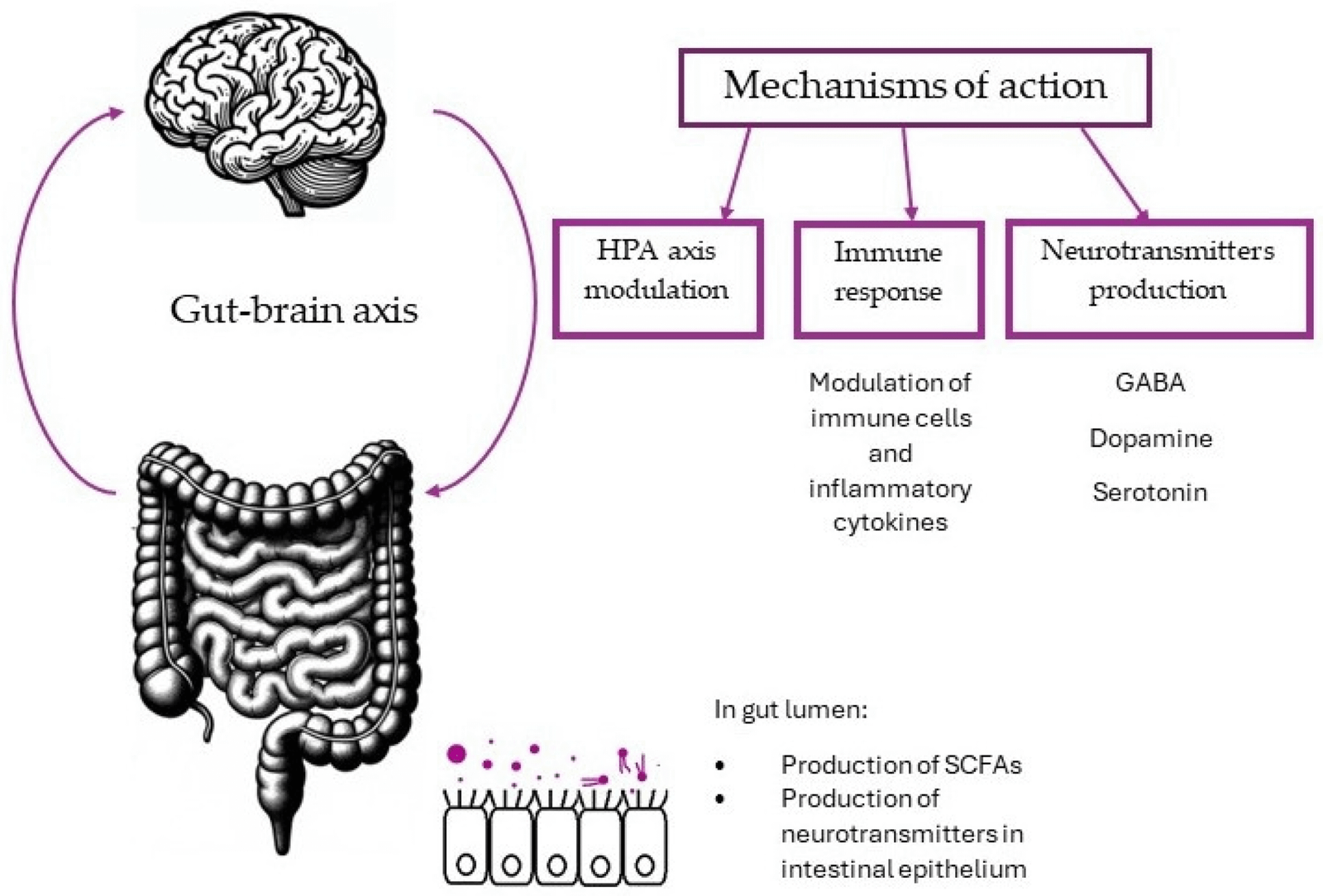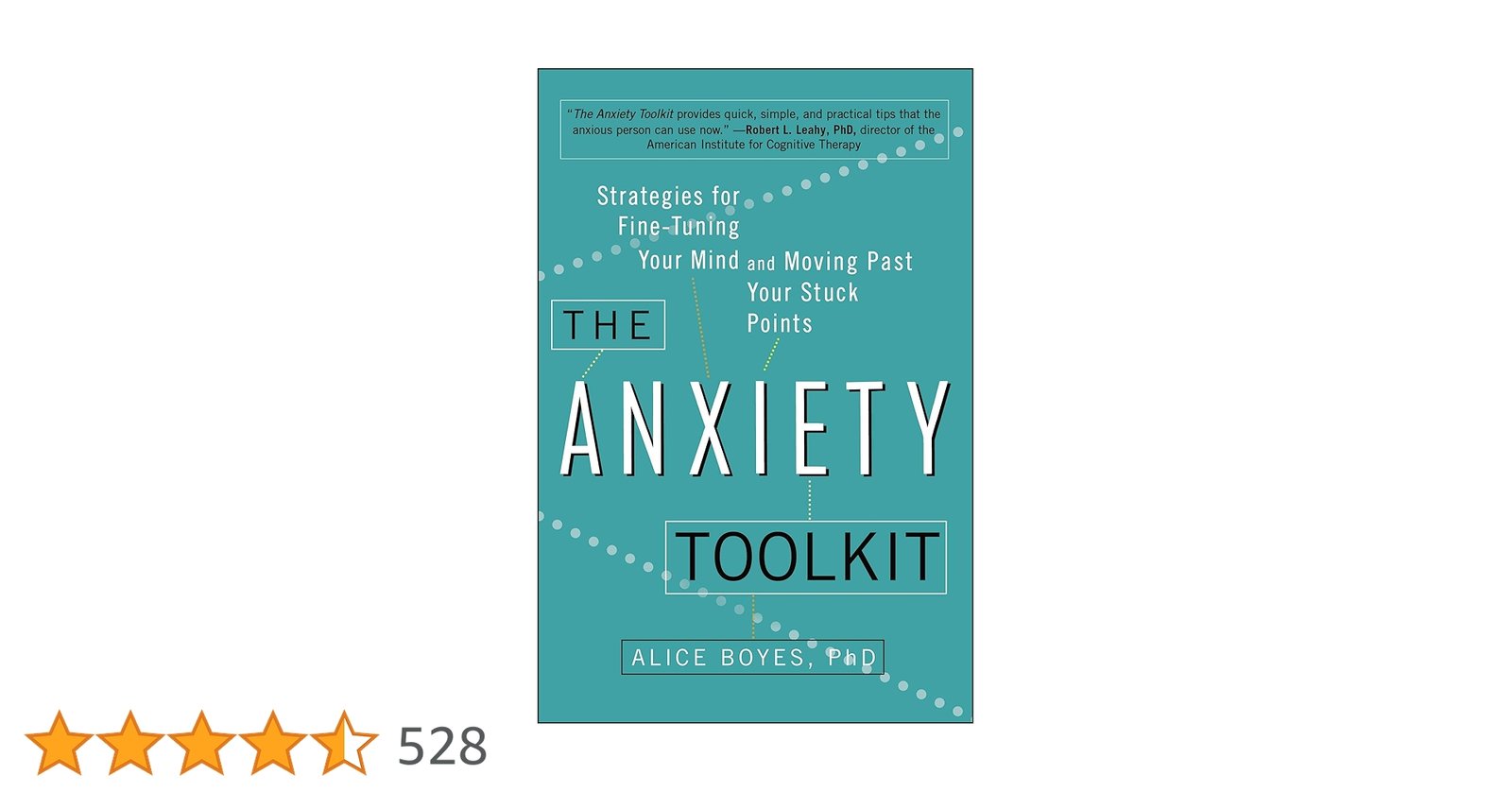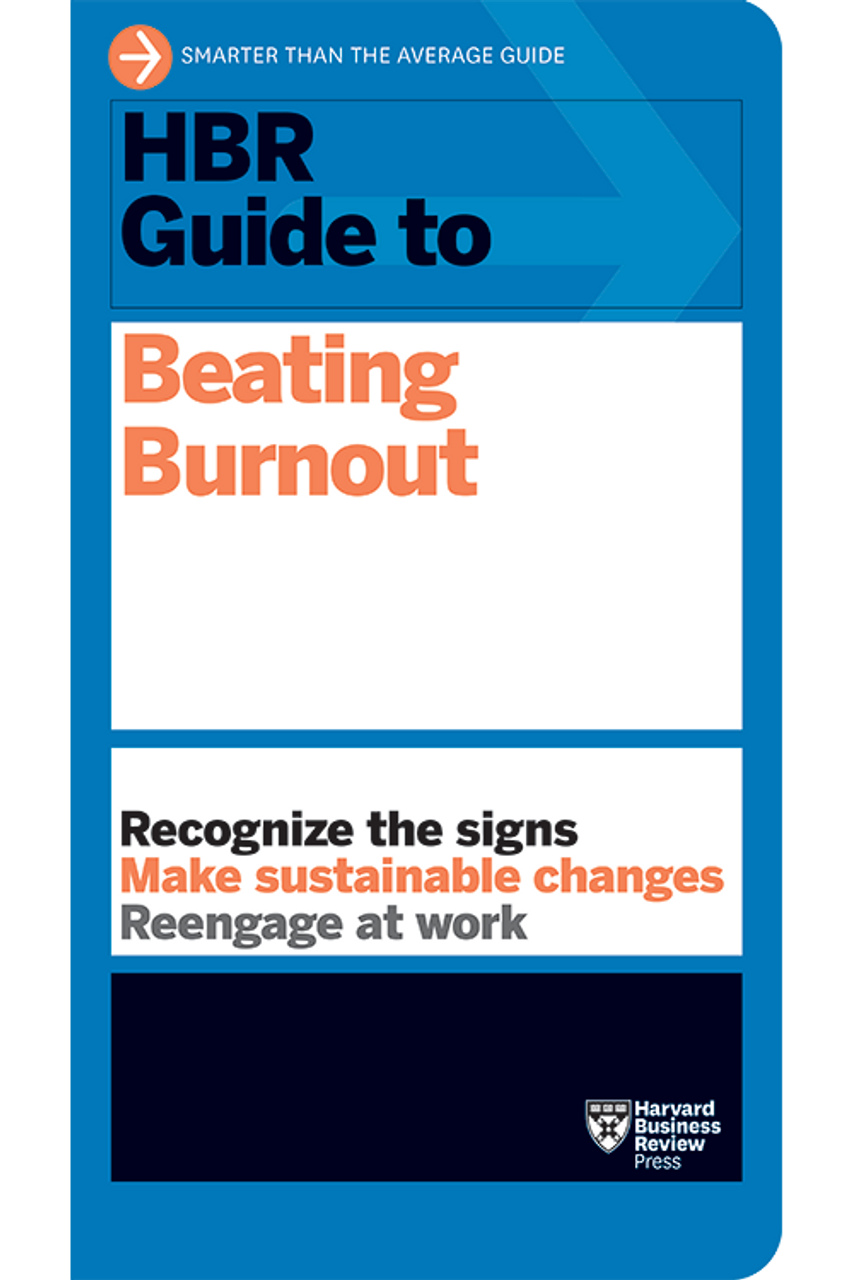Explore the groundbreaking science of psychobiotics and the gut-brain axis. Learn how gut health influences mental well-being and discover practical strategies to improve mood and reduce anxiety.
The Gut–Brain Connection
In recent years, research has uncovered a profound link between our gut health and mental well-being. Conditions like depression and anxiety, traditionally viewed as solely neurological disorders, are now understood to be influenced by the state of our gut microbiota. This emerging field, known as psychobiotics, explores how specific strains of probiotics can impact mental health by modulating the gut-brain axis.

Understanding the Gut–Brain Axis
The gut–brain axis is a complex communication network linking the gastrointestinal tract and the central nervous system. This bi-directional pathway involves:
- Neurotransmitter Production: The gut produces approximately 90% of the body’s serotonin, a neurotransmitter crucial for mood regulation.
- Immune System Modulation: Gut microbiota influence systemic inflammation, which has been associated with various mental health disorders.
- Vagus Nerve Signaling: The vagus nerve serves as a direct communication line between the gut and the brain, transmitting signals that can affect mood and behavior.
Disruptions in this axis, often termed “dysbiosis,” have been linked to conditions such as depression and anxiety.
What Are Psychobiotics?
Psychobiotics are live microorganisms that, when administered in adequate amounts, confer a health benefit to the host by influencing the gut-brain axis. Specific strains, such as Lactobacillus helveticus and Bifidobacterium longum, have demonstrated potential in alleviating symptoms of depression and anxiety.
Clinical Evidence Supporting Psychobiotics
A systematic review of randomized clinical trials indicated that certain psychobiotic strains could reduce symptoms of depression and anxiety by:
- Modulating Inflammatory Responses: Reducing systemic inflammation, a known contributor to mood disorders.
- Enhancing Neurotransmitter Production: Influencing the synthesis and activity of neurotransmitters like serotonin and GABA.
- Regulating the Hypothalamic-Pituitary-Adrenal (HPA) Axis: Balancing stress responses to mitigate anxiety symptoms.
However, while promising, these findings necessitate further research to establish standardized treatment protocols.
Dietary Strategies to Support Gut Health
Incorporating specific dietary practices can enhance gut health and, by extension, mental well-being:
- Increase Fiber Intake: Foods rich in fiber, such as fruits, vegetables, and whole grains, serve as prebiotics, nourishing beneficial gut bacteria.
- Consume Fermented Foods: Incorporating foods like kimchi, miso, and yogurt can introduce beneficial probiotics to the gut.
- Limit Processed Foods: Reducing intake of high-sugar and high-fat foods can prevent dysbiosis and associated mood disturbances.
A study from the University of Colorado Boulder found that prebiotic-fiber intake led to longer durations of restorative sleep phases like REM and NREM sleep, which are crucial for mood regulation.
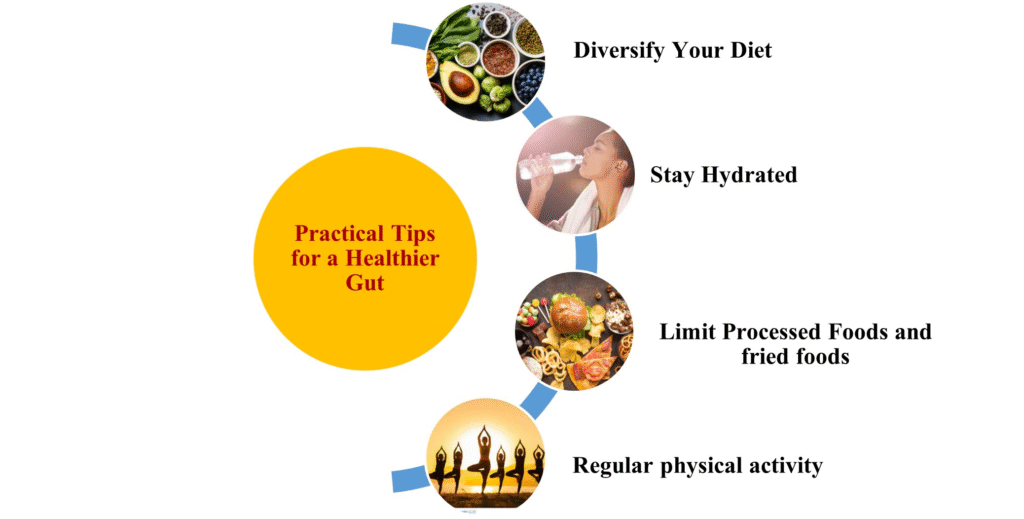
Lifestyle Practices to Enhance Gut and Mental Health
Adopting certain lifestyle practices can further support the gut-brain connection:
- Regular Physical Activity: Exercise has been shown to promote the growth of beneficial gut bacteria and reduce symptoms of depression and anxiety.
- Stress Management Techniques: Practices such as meditation, yoga, and deep-breathing exercises can reduce stress and positively influence gut health.
- Adequate Sleep: Ensuring sufficient and quality sleep is vital for both gut health and emotional regulation.
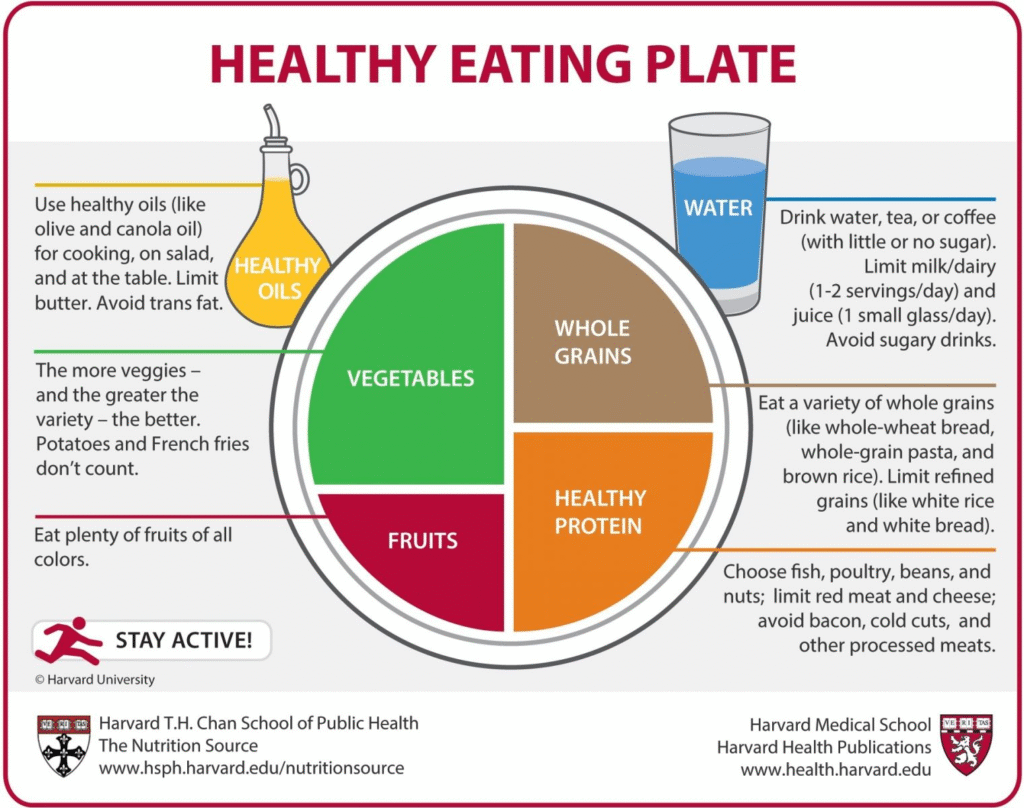
Frequently Asked Questions
1. What are psychobiotics?
Psychobiotics are specific strains of probiotics that, when consumed in adequate amounts, may confer a health benefit by positively influencing the gut-brain axis, potentially alleviating symptoms of depression and anxiety.
2. How do psychobiotics affect mental health?
Psychobiotics can influence mental health by modulating neurotransmitter production, reducing inflammation, and regulating the HPA axis, all of which play significant roles in mood and emotional regulation.
3. Can diet alone improve gut health and mental well-being?
While diet plays a crucial role in maintaining gut health, a holistic approach that includes proper nutrition, regular exercise, stress management, and adequate sleep is essential for optimal mental well-being.
4. Are there any risks associated with taking psychobiotics?
For most individuals, psychobiotics are considered safe. However, those with compromised immune systems or underlying health conditions should consult a healthcare professional before starting any new supplement regimen.
5. How long does it take to see benefits from psychobiotics?
The time frame can vary depending on the individual and the specific strain used. Some individuals may notice improvements within a few weeks, while others may require longer periods.
6. Can psychobiotics replace traditional treatments for depression and anxiety?
Psychobiotics should not replace conventional treatments but may serve as complementary therapies. It’s essential to consult with a healthcare professional before making any changes to your treatment plan.
7. Which foods are rich in probiotics?
Fermented foods such as kimchi, miso, yogurt, kefir, and sauerkraut are excellent sources of probiotics.
8. How can I increase fiber intake to support gut health?
Incorporate more fruits, vegetables, legumes, and whole grains into your diet to boost fiber intake, supporting the growth of beneficial gut bacteria.
9. Is there a connection between gut health and sleep quality?
Yes, a balanced gut microbiome can influence sleep patterns. Studies have shown that prebiotic-fiber intake can lead to longer durations of restorative sleep phases like REM and NREM sleep.
10. What lifestyle changes can support both gut and mental health?
Regular physical activity, stress management techniques, adequate sleep, and a balanced diet rich in fiber and probiotics can support both gut and mental health.
Real-Life Examples
Case Study 1: Sarah’s Journey to Mental Wellness
Sarah, a 32-year-old marketing professional, struggled with chronic anxiety and mild depression for years. After incorporating a diet rich in fiber, fermented foods, and regular physical activity, she noticed significant improvements in her mood and energy levels. Consulting with a healthcare professional, she introduced a psychobiotic supplement containing Lactobacillus helveticus and Bifidobacterium longum. Within six weeks, Sarah reported reduced anxiety symptoms and improved sleep quality.
Case Study 2: John’s Experience with Gut Health and Mood
John, a 45-year-old teacher, experienced mood swings and irritability. After undergoing a comprehensive gut health assessment, he discovered an imbalance in his gut microbiota. By adopting a diet rich in prebiotics and probiotics and engaging in regular stress-reducing activities, John observed a stabilization in his mood and a reduction in irritability over several months.
Practical Takeaways
- Consult Healthcare Professionals: Before starting any new supplement or making significant dietary changes, consult with a healthcare provider, especially if you have underlying health conditions.
- Start Gradually: Introduce dietary changes slowly to allow your gut microbiota to adapt, minimizing potential digestive discomfort.
- Monitor Your Symptoms: Keep track of any changes in mood, sleep patterns, or digestive health to assess the effectiveness of interventions.
- Maintain Consistency: Consistency in dietary and lifestyle practices is key to supporting gut health and mental well-being.
Conclusion
The emerging field of psychobiotics offers promising avenues for enhancing mental health through the modulation of gut microbiota. While more research is needed to establish definitive treatment protocols, integrating gut-friendly dietary practices and lifestyle changes can support both gut and mental health. As we continue to explore the intricate connections between our gut and brain, personalized approaches to mental well-being may become more accessible and effective.
